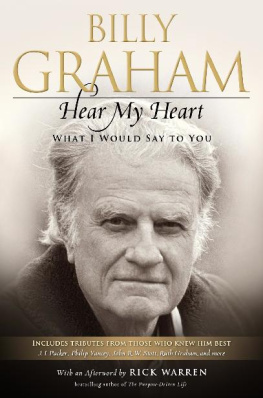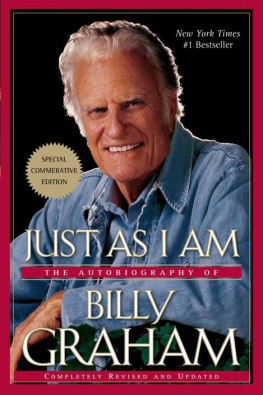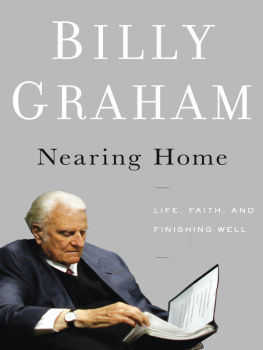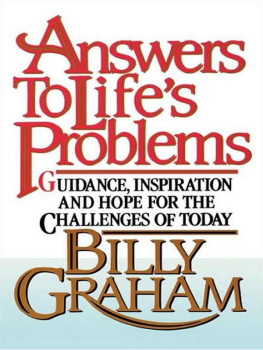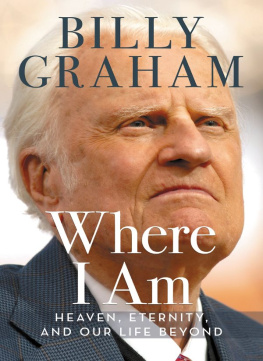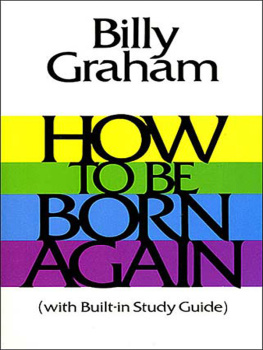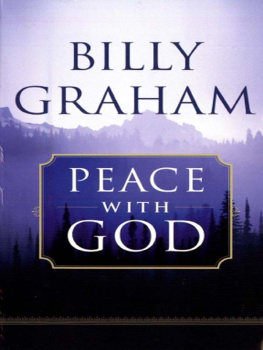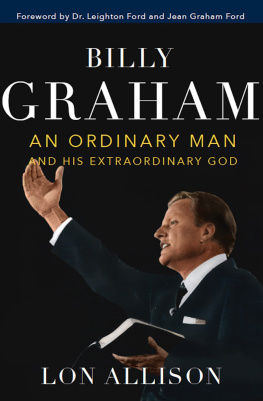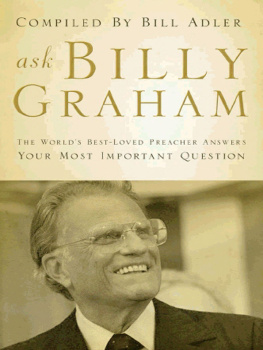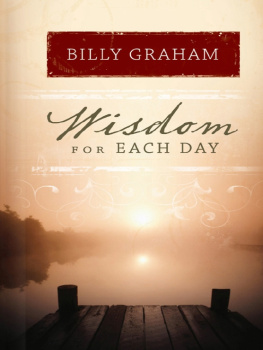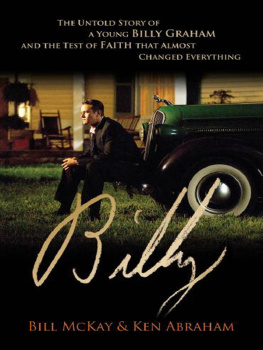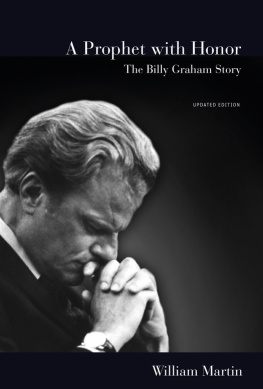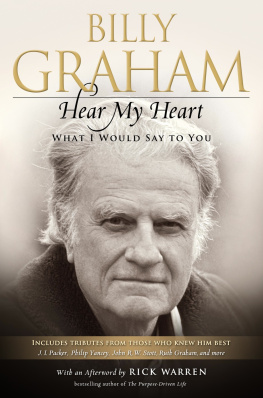Billy Graham - Hear My Heart
Here you can read online Billy Graham - Hear My Heart full text of the book (entire story) in english for free. Download pdf and epub, get meaning, cover and reviews about this ebook. year: 0, genre: Religion. Description of the work, (preface) as well as reviews are available. Best literature library LitArk.com created for fans of good reading and offers a wide selection of genres:
Romance novel
Science fiction
Adventure
Detective
Science
History
Home and family
Prose
Art
Politics
Computer
Non-fiction
Religion
Business
Children
Humor
Choose a favorite category and find really read worthwhile books. Enjoy immersion in the world of imagination, feel the emotions of the characters or learn something new for yourself, make an fascinating discovery.
- Book:Hear My Heart
- Author:
- Genre:
- Year:0
- Rating:3 / 5
- Favourites:Add to favourites
- Your mark:
- 60
- 1
- 2
- 3
- 4
- 5
Hear My Heart: summary, description and annotation
We offer to read an annotation, description, summary or preface (depends on what the author of the book "Hear My Heart" wrote himself). If you haven't found the necessary information about the book — write in the comments, we will try to find it.
Hear My Heart — read online for free the complete book (whole text) full work
Below is the text of the book, divided by pages. System saving the place of the last page read, allows you to conveniently read the book "Hear My Heart" online for free, without having to search again every time where you left off. Put a bookmark, and you can go to the page where you finished reading at any time.
Font size:
Interval:
Bookmark:
Thank you for downloading this Howard Books eBook.
Join our mailing list and get updates on new releases, deals, bonus content and other great books from Howard Books and Simon & Schuster.
C LICK H ERE T O S IGN U P
or visit us online to sign up at
eBookNews.SimonandSchuster.com

I had a Hindu student say to me in Madras, I would become a Christian if I could see one. And when he said that to me, he was looking at me. That was one of the greatest sermons ever preached to me.
B ILLY G RAHAM
By Marshall Shelley
B illy Graham was perhaps the most significant religious figure of the twentieth century, and the organizations and the movement he helped spawn continue to shape the twenty-first.
During his lifetime, Graham preached in person to more than two hundred million people and to millions more via television, satellite, and film. Nearly three million responded to the invitation at the end of his sermons to accept Jesus into your heart. He proclaimed the gospel to more people than any other preacher in history. In the process, Graham became Americas pastor, participating in presidential inaugurations and speaking during national crises such as the memorial services following the Oklahoma City bombing and the 9/11 attacks.
He became the friend and confidant of popes and presidents, queens and dictators, said Columbia University historian Randall Balmer, and yet even in his later years he possessed the boyish charm and unprepossessing demeanor to communicate with the masses.
Billy Graham was born in 1918 in Charlotte, North Carolina. He briefly attended Bob Jones College, graduating from Florida Bible Institute near Tampa and Wheaton College in Illinois. He was ordained a minister in the Southern Baptist Church in 1939; he pastored a small church in suburban Chicago and preached on a weekly radio program. In 1946 he became the first full-time staff member of Youth for Christ and launched his evangelistic campaigns. For four years (19481952) he also served as president of Northwestern Schools in Minneapolis. His 1949 evangelistic tent meetings in Los Angeles brought him to national attention, and his 1957 New York meetings, which filled Madison Square Garden for four months, established him as a major presence on the American religious scene.
Graham appeared regularly on the lists of most admired people. Between 1950 and 1990 he won a spot on the Gallup Organizations Most Admired list more often than any other American. Ladies Home Journal once ranked him second only to God in the category achievements in religion. He received both the Presidential Medal of Freedom (1983) and the Congressional Gold Medal (1996).
Sherwood Wirt, who for seventeen years edited the Graham organizations Decision magazine, cited one Scottish minister who made this observation about Graham: My first impression of the man at close quarters was not of his good looks but of his goodness; not of his extraordinary range of commitments, but of his own committedness to his Lord and Master. To be with him even for a short time is to get a sense of a single-minded man; it shames one and shakes one as no amount of ability and cleverness can do.
Graham was a model of integrity. Despite scandals and missteps that toppled other leaders and ministers, including Grahams friend Richard Nixon and a succession of televangelists, in six decades of ministry no one ever leveled a serious accusation of misconduct against him.
Thats not to say he wasnt seriously criticized. Some liberals and intellectuals called his message simplistic. Some fundamentalists considered him compromised for cooperating with mainline groups and the National Council of Churches. His moderate antisegregationist stance during the civil rights era drew fire from both sides: white segregationists were furious when he invited the agitator Martin Luther King, Jr., to pray at the 1957 New York City crusade; civil rights activists accused him of cowardice for not joining them on protest marches and getting arrested for the cause.
In 1982, when he visited the Soviet Union to preach the gospel at the invitation of the government, he touched off a firestorm of criticism. Despite having met with the Siberian SevenPentecostal dissidents who were seeking political asylumGraham was quoted as saying he had not personally seen any evidence of religious persecution. Some called him a traitor. But he insisted he would go anywhere to preach as long as there were no restrictions on his freedom to proclaim the gospel. He returned claiming he saw the hand of God working in the Soviet Union. He was fiercely attacked for being nave and a tool of the Soviet propaganda machine.
By 1990, however, after the fall of the Soviet Union, his prescience was vindicated when President George H. W. Bush said to the National Religious Broadcasters, Eight years ago, one of the Lords great ambassadors, Rev. Billy Graham, went to Eastern Europe and the Soviet Union and, upon returning, spoke of a movement there toward more religious freedom. And perhaps he saw it before many of us because it takes a man of God to sense the early movement of the hand of God.
Perhaps Grahams lasting legacy was his ability to present the gospel in the idiom of the culture. He did this brilliantly, making innovative use of emerging technologiesradio, television, magazines, books, a newspaper column, motion pictures, satellite broadcasts, the Internetto spread his message.
In the 1990s he re-engineered the formula for his crusades (later called missions out of deference to Muslims and others offended by the connotation of crusade). His standard youth night was revolutionized into a Concert for the Next Generation, with Christian rock, rap, and hip-hop artists headlining the event, followed by Billy Graham preaching. This format drew record numbers of young people who cheered the bands and then, amazingly, listened carefully to the octogenarian evangelist.
In addition he helped launch numerous influential organizations, including Youth for Christ, the Billy Graham Evangelistic Association, and Christianity Today. The ripple effect of his shaping influence extends to such schools as Wheaton College in Illinois, Gordon-Conwell Divinity School in Massachusetts, Northwestern College in Minnesota, and Fuller Seminary in California. His encouragement and support helped develop the Evangelical Council for Financial Accountability, Greater Europe Mission, Trans World Radio, World Vision, World Relief, and the National Association of Evangelicals.
He brought the global Christian community together through international conventions: a 1966 Congress on World Evangelism in Berlin; the 1974 International Congress on World Evangelization in Lausanne, Switzerland; and three huge conferences in Amsterdam for itinerant evangelists in 1983, 1986, and 2000, which drew nearly twenty-four thousand working evangelists from two hundred countries.
In many ways, Billy Graham both formed and embodied the evangelical movement. Theologian J. I. Packer attributes the evangelical convergence to Graham: Up to 1940 it was every institution for itself. There wasnt anything unitive about the situation. There were little outposts of resistance trying to keep their end up in the face of the liberal juggernaut. Increasingly, from the 1950s onward, evangelicals came together behind Billy Graham and the things he stood for and was committed to. It continues that way to the present.
For many, however, William Franklin Graham wont be remembered for these accomplishments. Hell always be Billy, as he preferred to be called. He titled his autobiography Just as I Am, a reflection of his humble spirit, taken from the hymn sung most often when he invited people to come forward and receive Gods love. And for millions, his humility before the Almighty encouraged them to approach God with that same spirit.
Next pageFont size:
Interval:
Bookmark:
Similar books «Hear My Heart»
Look at similar books to Hear My Heart. We have selected literature similar in name and meaning in the hope of providing readers with more options to find new, interesting, not yet read works.
Discussion, reviews of the book Hear My Heart and just readers' own opinions. Leave your comments, write what you think about the work, its meaning or the main characters. Specify what exactly you liked and what you didn't like, and why you think so.

